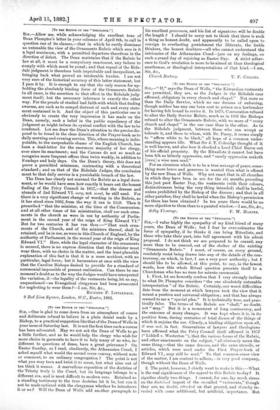[To THE EDITOR OF THE "SPECTATOR."] SIR,—Allow me, while acknowledging
the excellent tone of Dean Plumptre's letter in your columns of April 8th, to call in question one of its clauses,—that in which he curtly dismisses as untenable the view of the Ornaments Rubric which sees in it a legal maximum, with a permitted departure therefrom in the direction of defect. The Dean maintains that if the Rubric be law at all, it must be a compulsory enactment, any failure to
comply with which must be penal ; and that repeal of the Rids- dale judgment is therefore both improbable and inexpedient, as bringing back what proved an intolerable burden. I am not very sure of the historical accuracy of this latter statement, but
I pass it by. It is enough to say that the only reason for up- holding the absolutely binding force of the Ornaments Rubric in all cases, is the assertion to that effect in the Ridsdale judg- ment itself; but the necessary inference is exactly the other way. For the proofs of studied bad faith with which that finding swarms, are such as to compel distrust of each and every state- ment contained in it. And the object of this particular one is obviously to create the very impression it has made on the Dean, namely, such a belief in the public expediency of the judgment as might induce its cynical conflict with the law to be condoned. Let me draw the Dean's attention to the precise dis- proof to be found in the clear direction of the Prayer-book as to daily morning and evening service. This, whose meaning is indis- putable, to the unspeakable shame of the English Church, has been a dead-letter for the enormous majority of her clergy, ever since its enactment; and the Canons do not so much as recognise more frequent offices than twice weekly, in addition to Sundays and holy days. On the Dean's theory, this does not prove a permitted minimum, contrasting with a theoretical standard ; and on that of the Ridsdale Judges, the conclusion must be that daily service is a punishable breach of the law.
The Dean has clearly not scanned the Rubric as a legal docu- ment, or he would have seen how exactly it bears out the honest finding of the Privy Council in 1857,—that the dresses and utensils of 2nd Edward VI. may, not must, be still used. For there is a very significant change of wording in the Rubric, as it has stood since 1662, from the way it ran in 1559. Then it prescribed "that the minister, at the time of the Communion, and at all other times of his ministration, shall use such orna- ments in the church as were in use by authority of Parlia- ment in the second year of the reign of King Edward VI." But for two centuries it has run thus :—" That such orna- ments of the Church, and of the ministers thereof, shall be retained, and be in use, as were in this Church of England, by the authority of Parliament, in the second year of the reign of King Edward VI." Here, while the legal character of the ornaments is secured, there is no express direction that the minister must wear them, with no choice in the matter, and the least plausible explanation of this fact is that it is a mere accident, with no particular, legal force; but it harmonises at once with the view that the Caroline Bishops desired to provide for a standard of ceremonial impossible of present realisation. Can there be one moment's doubt as to the way the Judges would have interpreted the variation, if—the legality of the vestments being, let us say, unquestioned—an Evangelical clergyman had been prosecuted for neglecting to wear them F—I am, Sir, &c., RICHARD F. LITTLEDALE.
9 Red Lion Square, London, w.a, Easter, 1882.


































 Previous page
Previous page